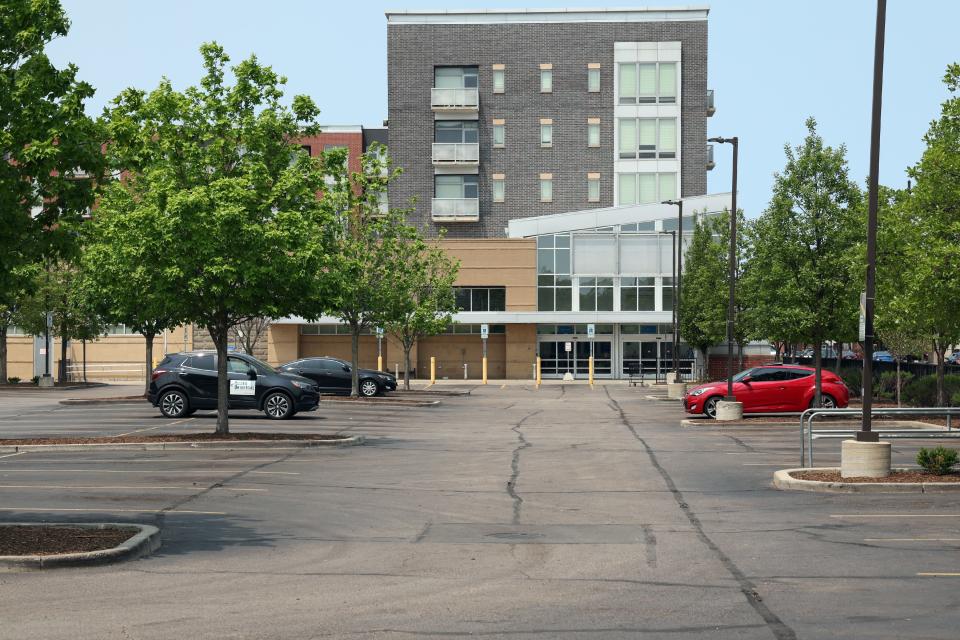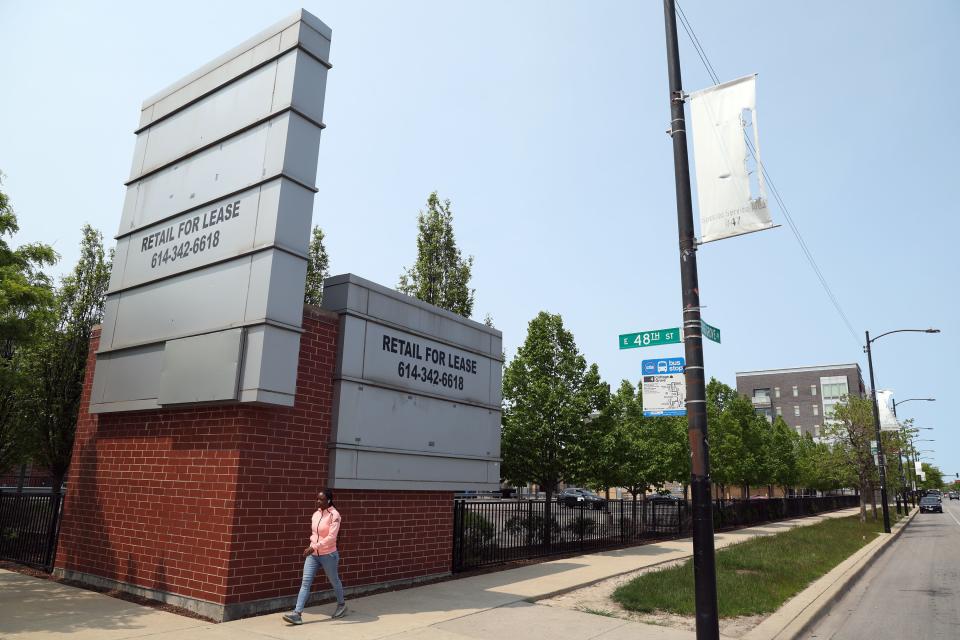Walmart shuttered South Side stores months after terms of developers’ tax incentive agreements expired
- Oops!Something went wrong.Please try again later.
When Walmart shuttered four Chicago stores in April, the closures set off a familiar pattern of dialogue across the city.
Residents of the majority-Black and Latino neighborhoods where three of the four stores were located worried the closures would make it harder for them to access affordable, fresh food. Elected officials, including then-Mayor Lori Lightfoot, slammed the abrupt nature of the closures, and questions emerged about whether Walmart had received government subsidies for opening stores in the city.
Walmart did not directly receive any tax incentives for the Chicago stores it closed. But two of the stores it shuttered, a Neighborhood Market grocery store in Grand Boulevard and a Supercenter in Chatham that also included a low-cost health clinic and a job training academy, were part of developments the city subsidized with tax increment financing dollars.
Public funds for both projects went to the sites’ developers. In both cases, the city required those developers to maintain certain levels or types of retail occupancy on their properties. But those requirements expired in December 2022. Months later, Walmart announced it would close the stores.
Walmart attributed the closures to the stores losing “tens of millions of dollars a year.”
Under the terms of the original agreements, the developer of the Grand Boulevard property that Walmart anchored was on the hook to replace the store with another grocer within a year if it closed down. In Chatham, the redevelopment agreement stipulated at least 70% of the shopping center be leased or occupied.
The developers remained in compliance with their respective agreements while they were still valid, the city said. But experts say the store closures show that cities have limited tools with which they can try to influence the behavior of private companies, even when they dole out public funds in hopes of attracting them. And even though Walmart did not breach any agreements, one alderman described the retailer’s actions as “disrespectful” and “disingenuous” and is co-sponsoring legislation to tighten the rules around incentives.
Cities like Chicago use incentives in hopes of stimulating economic development and reversing decades of disinvestment and poverty. In 2021, Chicago spent more than $302 million in TIF expenditures and netted more than $1.2 billion in TIF revenue. Cities use the terms of redevelopment agreements to try to extract benefits from companies, such as gaining a commitment from them that they will stay in a certain location for a certain amount of time.
But redevelopment agreements are imperfect tools, said Rachel Weber, a professor of urban planning and policy at the University of Illinois at Chicago.
“(Companies) shape their behavior to conform to the law, but often don’t go the next mile,” she said. “They are very much looking at the terms of these agreements and maybe the kinds of penalties that could ensue if they don’t adhere to these requirements. But once they have adhered (to the terms of the agreement), their locational behavior is in many ways up for grabs.”
Another problem, Weber said, is that agreements are typically signed with the original developers of the property. “The developers are very reluctant to write into their lease terms that their tenants — their commercial tenants — abide by these regulations,” she said.
Newly elected Ald. Lamont Robinson, whose 4th Ward includes one of the Walmart sites, introduced legislation in City Council Wednesday in hopes of strengthening the city’s side of the bargain in redevelopment agreements.
Robinson’s proposed ordinance would require the city to approve major tenants’ leases when they rent in developments that have received subsidies, excluding small businesses. The ordinance would also require those tenants to join redevelopment agreements as parties and could make them, along with the property’s owner and developer, liable in the event of defaults, he said. Property owners would be required to notify the city 180 days before it or a major tenant plans to vacate the property.
“We are giving these corporations very generous sweeteners to be able to come into communities like the one that I represent, and all we’re asking for is transparency,” Robinson said. “We’re asking for them to do the right thing by taxpayer resources and the community.”
In 2020, the City Council passed legislation that set a framework for the revocation of certain tax breaks from companies that don’t meet their obligations to the city.
Ald. Michael Rodriguez introduced that legislation after the botched Hilco smokestack demolition that coated his 22nd Ward in a cloud of dust; community residents had also called on Lightfoot to strip Hilco of $19.7 million in subsidies.
Rodriguez is a co-sponsor of the proposed TIF reform legislation, he said.
“I think what Walmart just did to our city was disrespectful, disingenuous and I think they need to be held accountable to that,” Rodriguez said. “Developers who are gonna take our tax subsidies and up and run after making promises need to be held accountable.”
In many developments, a big-box retailer such as Walmart is the “bait” for government incentives, said Greg LeRoy, executive director of Good Jobs First, a policy group that researches government subsidies. “It’s the big traffic draw,” he said.
In Grand Boulevard, the Walmart grocery store was the retail anchor of a mixed-use development called the Shops and Lofts at 47.
The Shops and Lofts, which opened in 2014, was financed with about $12.8 million in tax increment financing assistance in addition other loans, bonds and tax credit equity.
Most of the TIF funds were set aside for the mixed-income housing portion of the development; about $1.4 million went to the retail portion. The Shops and Lofts was developed by Mahogany Ventures, a joint venture of the Skilken Company and Troy Development.
“We provide the fresh food, variety of goods and jobs that people want and in turn, residents and the city have provided us with great support and patronage. We are proud to be a part of Shops and Lofts,” a then-regional manager for Walmart said in a statement when the Shops and Lofts opened.
Even though Walmart didn’t directly receive city subsidies, LeRoy said, the company likely used the subsidies given to the developer to “aggressively bargain down their rents and other terms of occupancy.” The company would not say how much it paid in rent at the Shops and Lofts.
Walmart, whose lease in Grand Boulevard does not expire until late 2034, said it was working with the property owner to find “reuse options” for the space.
A representative for the owner of the retail portion of the Shops and Lofts, Ace 2 Bronzeville, an LLC managed by Florida-based investment company Ace Equity Group, said the investment company did not know Walmart planned to vacate the property before the company’s April announcement. Ace bought the retail portion of the property in 2020.
The representative said the company was evaluating options for the space and declined to say whether the future tenant would be a grocer.
Robinson said he was in conversations with grocery operators interested in the now-vacant retail space at the Shops and Lofts.
In Chatham, Walmart operated a Supercenter in addition to a health clinic and the Walmart Academy, a job training facility, which it said it intends to donate to the community. The company opened both the health clinic and the Academy in the aftermath of the civil unrest of 2020, in which the Chatham store was heavily damaged. That summer, Walmart CEO Doug McMillon said the company was committed to staying in Chicago even though its stores here were “in many cases” not profitable.
Walmart owns the land it operated on in Chatham, which it purchased in 2011. The company did not provide details on plans for its other property in Chatham other than to say it was looking at “reuse options.”
As in Grand Boulevard, Walmart did not directly receive any tax incentives for its operations in Chatham. The developer of the shopping center, however, entered into a redevelopment agreement with the city in the mid-2000s in exchange for public funds and was ultimately approved for about $24.5 million in TIF dollars. To date, about $13.5 million of those funds have been disbursed, Department of Planning and Development Deputy Commissioner Peter Strazzabosco said.
Had the developer, an LLC operating under the name W2005 CMK Realty, defaulted on the occupancy requirement while it was still in place, the city would have had the right to lien the property for the value of the city funds provided to the developer, Strazzabosco said. The city could have also taken the developer to court to seek the return of all funding that had been provided to the developer up to that point, he said. The same remedies would have been available to the city had the developer defaulted on the Grand Boulevard redevelopment agreement.
“More likely outcomes would have been cures that were commensurate with the would-be defaults themselves and when they occurred relative to the terms of the RDAs,” Strazzabosco said.
Former 21st Ward Ald. Howard Brookins Jr. fought hard to bring Walmart, which faced fierce opposition from organized labor when it first tried to expand into Chicago, when he was in office.
Brookins said he still believed it had been worth it to fight to bring Walmart to Chatham, because it showed the community it could attract major retailers.
“They did provide a valuable service to the community,” Brookins said. “They just couldn’t make it work, or they just didn’t make it work.”
Brookins said any attempt at legislation to strengthen TIF agreements from the city’s side should be approached with caution. Retailers who are already hesitant to go into business in disinvested areas may simply choose not to if faced with additional restrictions from the city, he said.
“It was just so hard getting these multinational retail tenants to come to the South Side to begin with,” Brookins said. “Any other obstacles tossed in their way is gonna make it darned near impossible.”
In April, residents of Chatham and other South Side neighborhoods packed the Walmart Supercenter parking lot just days before the store was set to close, looking for final deals. A Walmart representative stood watch outside, ushering Tribune staffers away from the store’s main entrance. Chatham residents lamented the loss of yet another South Side grocer.
One shopper said that when the store closed, she would travel to the Walmart Supercenter in Pullman, about 6 miles southeast of the Chatham store.
“And then if they take it away,” she said, “I’m gonna go to Indiana.”
Chicago Tribune’s A.D. Quig, Brian J. Rogal and Alice Yin contributed.


